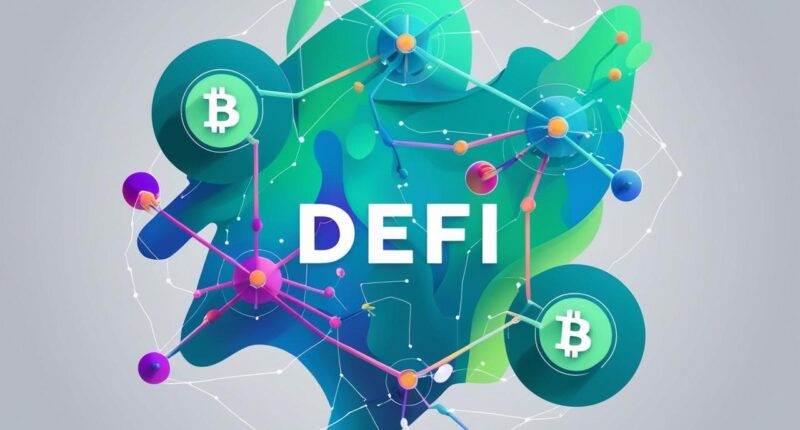Decentralized Finance, or DeFi, is a financial ecosystem that uses blockchain technology to enable direct transactions between users, removing the need for traditional banks. It incorporates features like decentralized exchanges, lending platforms, and stablecoins. DeFi has transformed how people engage with finance by promoting accessibility and offering new opportunities for investment. The ecosystem continues to evolve, presenting both benefits and challenges. To understand its full impact on cryptocurrency and the future of finance, further exploration is essential.
Decentralized finance, commonly known as DeFi, represents a growing movement within the cryptocurrency landscape that seeks to transform traditional financial systems. DeFi is built on blockchain technology, allowing for peer-to-peer financial services without intermediaries, such as banks. This system utilizes smart contracts, which are automated agreements that execute transactions based on predefined conditions, ensuring transparency and efficiency. Additionally, DeFi leverages the capabilities of Ethereum’s smart contracts, enhancing the functionality and trustworthiness of its financial applications.
The DeFi ecosystem comprises several key components, including decentralized exchanges (DEXs) where users can swap tokens directly, lending platforms that facilitate borrowing and lending without traditional banks, and yield farming, which allows users to earn rewards by providing liquidity. Stablecoins, cryptocurrencies pegged to fiat currencies, offer stability, while synthetic assets and tokenized real-world assets enable new investment opportunities. The emergence of Bitcoin-based projects further ignites interest in the altcoin market, enhancing the overall DeFi landscape. Additionally, automated management via smart contracts reduces human error, contributing to the overall efficiency of DeFi operations.
DeFi challenges centralized financial institutions by reducing transaction costs and increasing efficiency. It provides global access to financial services 24/7, promoting financial inclusion for unbanked populations who may lack access to traditional banking. As a result, DeFi introduces innovative investment strategies and opportunities, attracting a significant user base.
DeFi revolutionizes finance by enhancing efficiency, reducing costs, and fostering global access to financial services for the unbanked.
As of 2023, DeFi has experienced remarkable growth, with the total value locked in DeFi reaching $87 billion and unique users surpassing 4.8 million. While Ethereum remains the dominant blockchain for DeFi applications, other platforms like Binance Smart Chain and Solana are emerging, reflecting increased institutional interest and investment in DeFi projects.
However, DeFi is not without risks and challenges. Smart contracts can be vulnerable to hacks, and regulatory uncertainties may complicate compliance. The volatility of cryptocurrencies can lead to market manipulation and presents scalability issues, while the complexity of DeFi platforms can deter mainstream users.
Looking ahead, DeFi is expected to integrate further with traditional finance, develop user-friendly applications, and explore new markets, including decentralized insurance and derivatives. Innovations like layer 2 scaling solutions promise to enhance efficiency, paving the way for a more inclusive financial landscape.
Frequently Asked Questions
What Are the Risks Associated With Investing in Defi Projects?
Investing in decentralized finance (DeFi) projects carries several risks.
Smart contract vulnerabilities can lead to hacks, resulting in significant financial losses.
Regulatory uncertainty poses challenges, as sudden changes in laws may impact projects unexpectedly.
Market volatility can cause price swings, affecting investments, while liquidity risks may lead to sudden fund shortages.
Additionally, operational risks, such as reliance on oracles and potential governance centralization, can compromise user security and access to funds.
How Do Gas Fees Affect Defi Transactions?
Gas fees greatly affect DeFi transactions by impacting costs and user behavior.
These fees, paid to validators for processing transactions, can increase substantially during network congestion. As a result, small trades or yield farming may become unprofitable.
Users often time transactions to avoid high fees, leading to larger, less frequent trades. Consequently, some may turn to Layer 2 solutions or alternative blockchains to minimize costs and enhance their DeFi experience.
Can Defi Operate Without Traditional Banks?
DeFi can operate without traditional banks by utilizing decentralized blockchain networks. It employs smart contracts for automated transactions, allowing users to lend, borrow, and trade assets directly.
Users can access financial services globally without needing bank accounts or credit checks. However, challenges exist, including the absence of regulatory oversight, higher risks of vulnerabilities, and difficulties in converting fiat money.
Despite these challenges, DeFi continues to grow and innovate independently of traditional banking systems.
What Role Do Smart Contracts Play in Defi?
Smart contracts play an essential role in decentralized finance (DeFi) by enabling automated execution of agreements without the need for intermediaries.
They facilitate various functions, such as lending, borrowing, and trading, by managing collateral, interest payments, and liquidity pools.
Additionally, smart contracts guarantee transparency and efficiency in financial transactions.
However, they also carry risks, including coding errors and lack of regulatory oversight, which can impact the stability and security of DeFi applications.
How Can Beginners Start Exploring Defi Platforms?
Beginners can start exploring DeFi platforms by selecting a user-friendly wallet, such as MetaMask or Trust Wallet.
They should then choose platforms like Uniswap for token swaps or Aave for lending.
It is advisable to begin with low-risk activities, such as providing liquidity to stablecoin pairs or using DeFi savings accounts.
Educating themselves on smart contract risks, tracking investments, and participating in community discussions can further enhance their understanding and safety in DeFi.
References
- https://osl.com/academy/article/how-bitcoins-growth-impacts-altcoins-and-defi
- https://www.bcbgroup.com/insights/defi-what-is-it-and-how-is-it-impacting-the-cryptocurrency-industry/
- https://www.bis.org/publ/qtrpdf/r_qt2112b.pdf
- https://www.taxbit.com/blogs/what-is-defi-and-how-does-it-work/
- https://www.bankofcanada.ca/2023/10/staff-analytical-note-2023-15/
- https://www.brookings.edu/articles/cryptocurrencies-and-decentralized-finance-defi/
- https://www.berghahnbooks.com/downloads/OpenAccess/ShapiroCrypto/9781805392941_OA.pdf
- https://www.oliverwyman.com/our-expertise/insights/2023/apr/decentralized-finance-reshape-capital-markets.html
- https://www.investopedia.com/decentralized-finance-defi-5113835
- https://github.com/tatsu-lab/alpaca_eval/blob/main/results/baize-v2-13b/model_outputs.json









